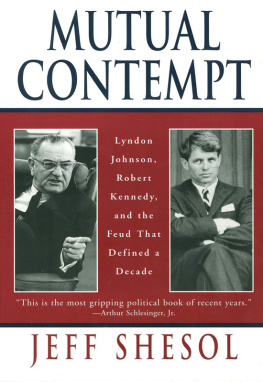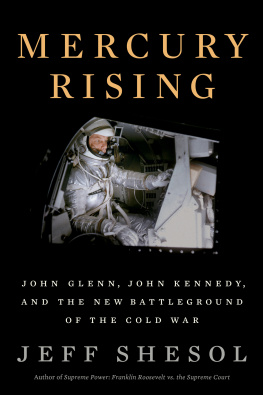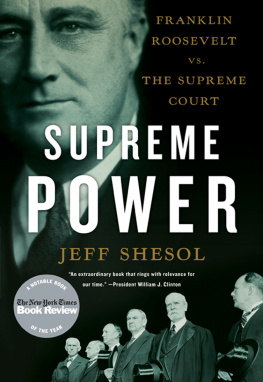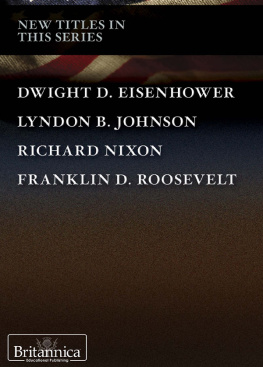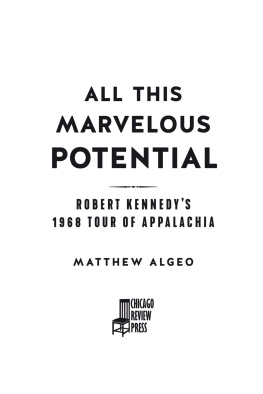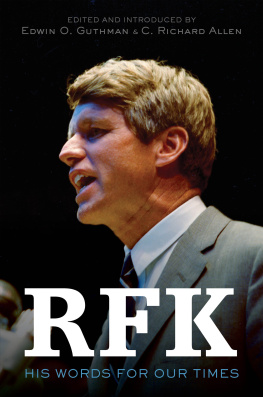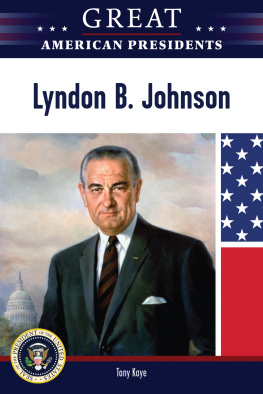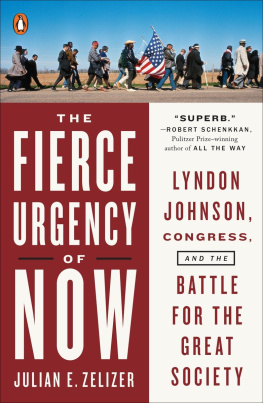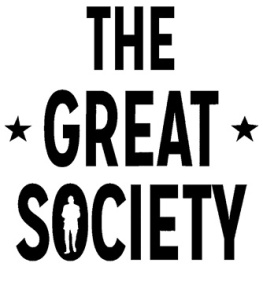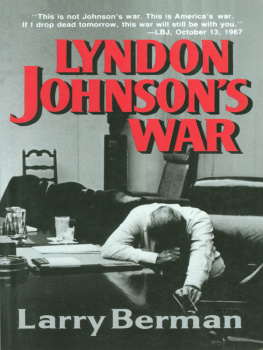MUTUAL
CONTEMPT
MUTUAL CONTEMPT
Lyndon Johnson, Robert Kennedy,
and the Feud That Defined a Decade
JEFF SHESOL

To my parents, Susan and Barry
Copyright 1997 by Jeff Shesol
All rights reserved
Printed in the United States of America
First published as a Norton paperback 1998
For information about permission to reproduce selections from this book, write to Permissions, W. W. Norton & Company, Inc., 500 Fifth Avenue,
New York, NY 10110.
The text of this book is composed in Bembo with the display set in Palatino.
Composition by JoAnn Schambier.
Manufacturing by Quebecor Printing, Fairfield Inc.
Library of Congress Cataloging-in-Publication Data
Shesol, Jeff.
Mutual contempt : Lyndon Johnson, Robert Kennedy, and the feud that defined a decade / Jeff Shesol.
p. cm.
Includes bibliographical references and index.
ISBN 0-393-04078-X
1. Johnson, Lyndon B. (Lyndon Baines), 19081973. 2. PresidentsUnited StatesBiography. 3. Kennedy, Robert F., 19251968. 4. LegislatorsUnited StatesBiography. 5. United StatesPolitics and government19631969. I. Title.
E847.2.S48 1997
973.923092dc21
[B] 97710 CIP
eISBN 978-0-393-34597-1
W. W. Norton & Company, Inc., 500 Fifth Avenue, New York, N.Y. 10110
http://www.wwnorton.com
W. W. Norton & Company Ltd., 10 Coptic Street, London WC1A 1PU
2 3 4 5 6 7 8 9 0
CONTENTS
T his book, like every other, is a team effort. I am deeply indebted to the Johnson and Kennedy associates who agreed to be interviewed and were so generous with their time and recollections: David Black, Liz Carpenter, George Christian, Clark Clifford, Joe Dolan, Peter Edelman, Daniel Ellsberg, Myer Feldman, Grenville Garside, William Geoghegan, Nicholas Katzenbach, Lawrence Levinson, Ron Linton, Frank Mankiewicz, Harry McPherson, Melody Miller, Matthew Nimetz, DeVier Pierson, George Reedy, Walt W. Rostow, the late Dean Rusk, Pierre Salinger, Arthur M. Schlesinger, Jr., Theodore Sorensen, Stewart Udall, Jack Valenti, William vanden Heuvel, Adam Walinsky, Lee White, and Roger Wilkins. Their stories added nuance to my picture of an often stark conflict.
I am grateful to the staff of the Lyndon Baines Johnson Library in Austin for their tireless assistance. Charlene Burgess, Tina Houston, Mary Knill, and E. Philip Scott were especially helpful, and Claudia Anderson and Linda Hanson helped to orient meno small taskin the librarys vast holdings of oral histories. The Lyndon B. Johnson Foundation generously funded my extended stay in Austin. The John F, Kennedy Library in Boston showed similar generosity by providing a Kennedy Research Grant, and William Johnson and Stephen Plotkin guided me through the Robert F. Kennedy Papers. Staff members at the Library of Congress, the National Archives, and the Martin Luther King Public Library in Washington were also helpful.
Old friends and new acquaintances gave support of every kind. Dan Buck, Andrea Camp, Joe Dolan, Paul Kirk, Dick Schmidt, Patrick Shea, and Amanda Smith provided valuable contacts and sources. Stan Oliner of the Colorado Historical Society helped to uncover grants and other resources. My uncle, David Pliner, put cutting-edge printing technology at my disposal to produce manuscripts bound and unbound, and always at the eleventh hour. Creators Syndicateparticularly Laura Mazer, Rick Newcombe, Mike Santiago, Katherine Searcy, Anita Tobias, and Anthony Zurcherwas supportive even when deadlines were stretched.
Many friends became, in many different ways, important contributors: Jeff Dolven, David Greenberg, Francesco Lecciso, Nader Mousavizadeh, Ed Pallesen, David Sartorius, and Len Stark read portions of the manuscript and offered thoughtful and always tactful commentary. In 1991, Brown professors Patricia Herlihy and the late William McLaughlin read my senior thesisin effect, an early draft of this bookand wrote comprehensive critiques. Sean Hartgrove, David Krovitz, Nancy ONeill, and Jay Strell provided counsel and companionship from the beginning. Richard Halstead, Jon Levitsky, Eric Liu, Jesse Malkin, and Sophie Oltivnyi contributed helpful ideas I have done my best to incorporate. Brian Floca, Brian and Elle Ohleyer, and David Whitney in Massachusetts and Carol deOnis in Texas were my Boston-Austin connections, and showed me true Yankee and Southern hospitality, respectively. Brian Ohleyer, to whom I am indebted for so much more than that, told a good Johnson story and lived every bit as expansively, announcing his presence in a room, and in our lives, like LBJ bursting into a tea party of Kennedy ladies. He is deeply, badly missed.
I am especially grateful for the invaluable help and encouragement of three Bancroft Prize-winning historians. Arthur M. Schlesinger, Jr., took time away from other projects to read a manuscript that must have arrived at his door with a discomfiting thud; he was forthcoming with encouragement and helpful criticism, and I am profoundly thankful for both. I am also lucky to count Robert Dallek as friend and mentor. His greatest contribution to this bookin addition to anecdotes, sources, and tapeswas the complex understanding of LBJ his own work has engendered. James T. Patterson, in 1990, scribbled three hopeful words in red pen in the margin of a thesis proposal: Should be interesting. Since then, he has guided this project through its every stage, from honors thesis to manuscript to final product, and always with the gruff candor and warm humor he shows his students at Brown University. What is best in this book bears his imprint.
My editor, Starling Lawrence, endowed this book with his experience, his critical eye, and his wit. He saw from the beginning that the story of Johnson and Kennedy is far more than a good brawl. Patricia Chui responded to all my queries with humor, patience, and good judgment. I also wish to thank Henning Gutmann for investing both his enthusiasm and his confidence in this project. And Rafe Sagalyn, my agent, was the first to say, its a book. As usual, he was right, and I owe him countless debts of gratitude.
Through a process that was by turns exciting and imposing, my parents, Susan and Barry, my brother, Robert, and my grandparents, Lawrence and Ann Shesol, sustained me in countless ways, boosting my confidence and offering more title ideas than a thesaurus. To my family I offer the deepest thanks and love for a lifetime of that kind of support.
L yndon Johnson and Robert Kennedy loathed each other. This man, Kennedy said of Johnson, is , Their mutual contempt was so acute, their bitterness so intense and abiding, they could scarcely speak in each others presence. When they did speak, cordiality quickly gave way to uneasy silence or a shouting match. Alone or with friends and assistants, each man ranted and obsessed, sulked and brooded about the other. Kennedy and Johnson spent the 1960s listening for footsteps, looking over their shoulders, making few important decisions without first considering the feud.
Politics, of course, is full of heated rivalries. The rancorous debates of the 1990s have buried the romantic (or cynical) notion that political differences can be finessed by an after-hours whiskey among gentlemen. Still, Bill Clinton and Newt Gingrich are no Johnson and Kennedy. The rivalry between LBJ and RFK was of a different magnitudeand of greater importancethan any of the postwar era. Their antagonism spawned political turf battles across the United States. It divided constituencies the two men once shared and weakened their party by forcing its members to choose between them. It captivated the newly powerful media that portrayed every disagreement between Johnson and Kennedy as part of a prolonged battle for the presidency or a claim on the legacy of the fallen JFK. It helped propel one man to the Senate and drive the other from the White House.

